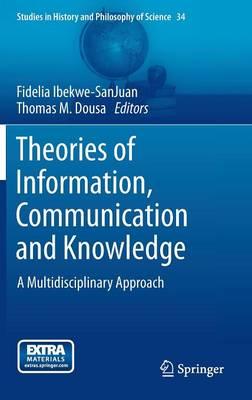Overview
This book addresses some of the key questions that scientists have been asking themselves for centuries: what is knowledge? What is information? How do we know that we know something? How do we construct meaning from the perceptions of things? Although no consensus exists on a common definition of the concepts of information and communication, few can reject the hypothesis that information – whether perceived as « object » or as « process » - is a pre-condition for knowledge. Epistemology is the study of how we know things (anglophone meaning) or the study of how scientific knowledge is arrived at and validated (francophone conception). To adopt an epistemological stance is to commit oneself to render an account of what constitutes knowledge or in procedural terms, to render an account of when one can claim to know something. An epistemological theory imposes constraints on the interpretation of human cognitive interaction with the world. It goes without saying that different epistemological theories will have more or less restrictive criteria to distinguish what constitutes knowledge from what is not. If information is a pre-condition for knowledge acquisition, giving an account of how knowledge is acquired should impact our comprehension of information and communication as concepts. While a lot has been written on the definition of these concepts, less research has attempted to establish explicit links between differing theoretical conceptions of these concepts and the underlying epistemological stances. This is what this volume attempts to do. It offers a multidisciplinary exploration of information and communication as perceived in different disciplines and how those perceptions affect theories of knowledge.
Full Product Details
Author: Fidelia Ibekwe-SanJuan ,
Thomas M Dousa
Publisher: Springer
Imprint: Springer
Edition: 2014 ed.
Volume: 34
Dimensions:
Width: 15.50cm
, Height: 2.00cm
, Length: 23.50cm
Weight: 6.328kg
ISBN: 9789400769724
ISBN 10: 9400769725
Pages: 331
Publication Date: 13 September 2013
Audience:
Professional and scholarly
,
Professional & Vocational
Format: Hardback
Publisher's Status: Active
Availability: Manufactured on demand

We will order this item for you from a manufactured on demand supplier.
Reviews
From the book reviews: The standard of writing is generally very good and there is evidence that the editors have done a good job in ensuring a high quality of intellectual argument. this is an excellent introduction to the rich and varied debates around the nature of information, revealing that the field is actually far from agreement. There is also sufficient depth and breadth to make it a valuable resource for the more knowledgeable as well. (John Mingers, Cybernetics and Human Knowing, Vol. 21 (3), 2014)




